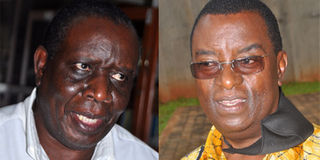Makerere dons accuse NRM of plot to bribe voters

Makerere University political scientists, Dr Ndebesa Mwambutsya (left) and Dr Nixon Kamukama. PHOTOS/ STEPHEN OTAGE
What you need to know:
While lecturing university students from the United States of America about Uganda’s political history, the political scientists Dr Ndebesa Mwambutsya and Dr Nixon Kamukama both from the Department of Political Science, said the motive of the supplementary budget request is suspect because it comes shortly after the passing of the national budget and a few days to the national election campaigns.
Two Makerere University political scientists have questioned the timing of the Shs541b supplementary budget Parliament allocated to State House this week, suggesting it is a plan to be used during elections to influence voters.
While lecturing university students from the United States of America about Uganda’s political history, the political scientists Dr Ndebesa Mwambutsya and Dr Nixon Kamukama both from the Department of Political Science, said the motive of the supplementary budget request is suspect because it comes shortly after the passing of the national budget and a few days to the national election campaigns.
“It may not be for buying voters but for influencing voters. The President’s office should be having a lot of savings because the President is not making up-country trips. Why ask for a supplementary budget three and a half months into the new budget? What is the urgency and within the supplementary budget is a State House classified budget?” Dr Ndebesa asked.
He said unlike other years when government asked for a supplementary budget several months after passing of the national budget, this year’s is suspect because the request is coming close to the national elections due in February 2021.
Allegations
His colleague, Dr Kamukama, who said he was contracted to coordinate the NRM primaries in the western region, said there was massive use of money during the party elections to buy voters and bribe election returning officials.
“People who had money took it all. They were buying people to vote for them. It is only a mad person who can spend Shs200m to buy Results Declaration Forms from the returning officials,” he said.
Dr Kamukama added that during the elections for the special interest groups, candidates hired hotels for members of the electoral colleges where they fed and paid them to deny opponents access to them and only took them to the polling centre the following day for voting.
Asked to comment on the allegations, Mr Emmanuel Dombo, the NRM director of communications, said they do not condone election malpractice but like any community, they cannot avoid individuals who practise it.
Commenting on the supplementary budget for State House budget, he said it is not illegal because even as the country goes into elections, some covert and overt operations have to continue operating and they have to be facilitated.
“The State House budget has to have evidence of what is going to be done and this is always audited. It is not illegal,” he said.




